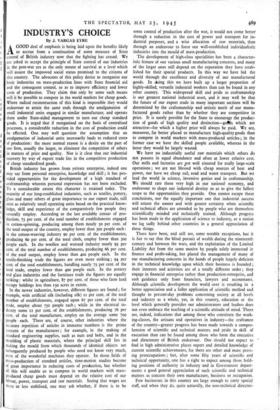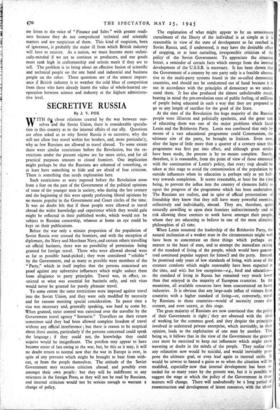INDUSTRY'S CHOICE
By J. VARGAS EYRE GOOD deal of emphasis is being laid upon the benefits likely
A
to accrue from a continuation of some measure of State control of British industry now that the fighting has ceased. We are asked to accept the principle of State control of our industries in the post-war era as the only means of survival at a level which will assure the improved social status promised to the citizens of this country. The advocates of this policy desire to reorganise our costs of production. They claim that only by some such means will it be possible to compete in the world markets for cheap goods. Where radical reconstruction of this kind is impossible they would endeavour to attain the same ends through the amalgamation of small industrial units engaged in similar manufacture, and operate them under State-aided management to turn out cheap standard goods. It is urged that if reorganised on the basis of centralised processes, a considerable reduction in the cost of production could be effected. One may well question the assumption that an amalgamation of industrial units necessarily leads to reduced costs of production: the more normal reason is a desire on the part of one firm, usually the larger, to eliminate the competition of others in matters of price and quality. Nor is it clear that our industrial recovery by way of export trade lies in the competitive production of cheap standardised goods.
British industry has grown from private enterprise, indeed one may say from personal enterprise, knowledge and skill ; it has pro- vided opportunities for the development of a high standard of craftsmanship wherein personal expression has not been excluded. To a considerable extent this character is retained today. The majority of our long-established industries, such as textiles, pottery, glass and many others of great importance to our export trade, still exist as relatively small operating units based on the practical know- ledge, skill and experience of the comparatively few people they severally employ. According to the last available census of pro- duction, 75 per cent. of the total number of establishments engaged in cotton-spinning, producing among them nearly 5o per cent. of the total output of the country, employ fewer than 30o people each: in the cotton-weaving industry 90 per cent. of the establishments, producing 6o per cent. of the total cloth, employ fewer than 300 people each. In the woollen and worsted industry nearly 93 per cent. of the total number of establishments, producing 66 per cent. of the total output, employ fewer than 40o people each. In the textile-finishing trade the figures are even more striking ; 94 per cent. of the total establishments, handling nearly 75 per cent. of the total trade, employ fewer than 40o people each. In the pottery and glass industries and the furniture trade the figures are equally striking: whilst in agriculture, 87 per cent. of those who farm land occupy holdings less than 15o acres in extent.
In the newer industries, however, different figures are found ; for example, with artificial silk (including silk) II per cent. of the total number of establishments, engaged upon 67 per cent. of the total trade, employ about 75o people each ; while in the electrical in- dustry some 12 per cent. of the establishments, producing 76 per cent. of the total manufacture, employ on the average some 700 people each. There are, of course, other industries where the accurate repetition of articles in immense numbers is the prime concern of the manufacturer ; for example, in the making of standard engineering supplies, such as nuts and bolts, and in the moulding of plastic materials, where the principal skill lies in making the mould from which thousands of identical objects are subsequently produced by people who need not know very much, even of the wonderful machines they operate. In those fields of mass-production of standard articles, time-motion studies become of great importance in reducing costs of production, but whether all this will enable us to compete in world markets with mass- Produced cheap goods must depend on the relative cost of our labour, power, transport and raw materials. Seeing that wages are more or less stabilised, one may ask whether, if there is to be
some control of production after the war, it would not come better through a reduction in the cost of power and transport for in- dustrial purposes, and a wise allocation of raw materials, than through an endeavour to force our well-established individualistic industries into the mould of mass-production.
The development of high-class specialities has been a character- istic feature of our various small manufacturing concerns, and many of the larger ones still depend on the reputation they have estab- lished for their special products. In this way we have led the world through the excellence and diversity of our manufactured goods. In doing this we have built up a larger proportion of highly-skilled, versatile industrial workers than can be found in any other country. This widespread skill and pride in craftsmanship is our greatest national industrial asset, and it may well be that the future of our export trade in many important sections will be determined by the craftsmanship and artistic merit of our manu- factured goods rather than by whether they arc competitive in price. It is surely possible for the State to encourage the produc- tion of goods of high quality and distinction—golds which are attractive—for which a higher price will always be paid. We are, moreover, far better placed to manufacture high-quality goods than to compete in world markets with mass-produced articles ; in the former case we have the skilled people available, whereas in the latter they would be largely wasted.
We have no industrially useful raw materials which others do not possess in equal abundance and often at lower relative cost. Our mills and factories are pot well situated for really large-scale operations ; we are not blessed with cheap sources of heat and power, nor have we cheap rail, road and water transport. But we lead the world in science, inventive genius and in craftsmanship. We should rate these very high in our national economy, and endeavour to shape our industrial destiny so as to give the fullest scope to the opportunities they provide. One cannot escape these conclusions, nor the equally important one that industrial success will return the sooner and with greater certainty when scientific and technical affairs are attended to by people who are themselves scientifically minded and technically trained. Although progress has been made in the application of science to industry, as a nation we lag sadly behind other countries in a general appreciation of these things.
There have been, and still are, some notable exceptions, but it is fair to say that the blind pursuit of wealth during the nineteenth century and between the wars, and the exploitation of the Limited Liability Act from the same motive by people solely interested in finance and profit-taking, has placed the management of many of our manufacturing concerns in the hands of people largely deficient in the technical knowledge upon which their business is founded ; their interests and activities are of a totally different order ; they engage in financial enterprise rather than production-enterprise, and seek guidance only from financiers, lawyers and accountants. Although scientific development the world over is resulting in a better appreciation and a fuller application of scientific method and thought to present-day problems concerning society at all levels and industry as a whole, yet, in this country, education at the level which generally provides our administrators and leaders does not even embrace the teaching of a scientific attitude of mind. There are, indeed, indications that among those who constitute the work- ing-classes, the artisans and operatives in industry—the craftsmen of the country—greater progress has been made towards a compre- hension of scientific and technical matters and pride in skill of execution than can be found among those who form the executive and directorate of British endeavour. One should not expect to find in high administrative places expert and detailed knowledge of current scientific achievements, for there are other and more press- ing preoccupations ; but, after some fifty years of scientific and technical opportunity, one has a right to expect among those hold- ing positions of authority in industry and in Government depart- ments a good general appreciation of such scientific and technical matters as concern their own manufacture, business or ,occupation.
Few businesses in this country are large enough to carry special staff, and when they do, quite naturally, the non-technical director- ate listen to the voice of " Finance and Sales " with greater readi- ness because they do not comprehend technical and scientific matters and are suspicious of them. This kind of suspicion, born of ignorance, is probably the major ill from which British industry will have to recover. As a nation, we must become more techni- cally-minded if we are to continue as producers, and our goods must rank high in craftsmanship and artistic merit if they are to sell. The problem is to bring about- an effective fusion of scientific and technical people on the one hand and industrial and business people on the other. These questions are of the utmost import- ance if British industry is to weather the cold blast of competition from those who have already learnt the value of whole-hearted co- operation between science and industry at the highest administra- tive level.



























 Previous page
Previous page